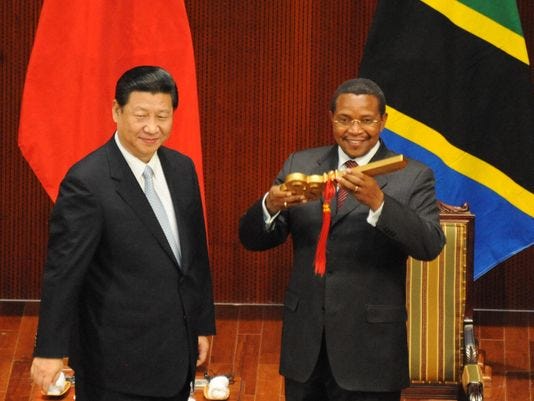
Photo: John Lukuwi, AFP/Getty Images
Incoming Chinese president Xi Jinping’s first trip as head of state took him to Russia, Tanzania, South Africa and the Republic of Congo late last month. His inaugural trip was much heralded back in China as an assertion of Beijing’s growing soft power, and its ability to develop friendly relations with resource-laden nations. Xi began his trip in Moscow, where he spoke with Russian President Vladimir Putin about China’s desire for oil and gas, as well as expanding trade in high-tech industries and tourism. His first stop on the African continent was Tanzania, where Xi outlined China’s foreign policy toward all African nations — of putting forth China’s best efforts toward African development and insisting on equality among all countries, irrespective of size, strength and wealth.
Last year, China’s charm offensive in Africa led to the announcement by former President Hu Jintao of US$20 billion in loans to African countries over the coming three years, part of what China insists is a no-strings-attached aid policy. Xi’s follow-on visit to the region emphasized his commitment to honor that pledge, and Xi signed more than a dozen trade and cooperation agreements with Tanzania, including plans to jointly develop a port and trade complex, a loan for telecom development and an interest free loan to the Tanzania government. China is already contributing $3 billion to develop Tanzania’s iron ore and coal reserves and one of its state owned energy companies is paying $4 billion for a minority stake in the world’s biggest off-shore natural gas field near the Mozambique-Tanzania border. During his trip to the Republic of Congo, Xi signed a series of deals which included a river port in Oyo and a sea port in Pointe-Noire for the export of mineral ores. China and Congo have already launched projects worth several billion dollars, including a power plant and a 300-mile motorway between Brazzaville and Pointe-Noire.
According to a report in Xinhua, China’s news agency, Xi stated “China will continue to offer, as always, necessary assistance to Africa with no political strings attached.” Xi was reportedly praised for this approach in each of the African countries he visited, though his itinerary was likely chosen carefully beforehand. China’s no-strings attached aid policy also plays well with the locals, who have show some of the highest levels of support for the Chinese leadership, according to a Gallup World poll of global attitudes conducted in 2011. According to the results of the poll, sub-Saharan African states showed the greatest levels of support, filling the top 20 positions in the worldwide survey.
China’s growing trade and energy relationship, however, has caused alarm bells to ring in Washington. Beijing’s no-strings attached aid policies are seen as undermining the aid efforts of the U.S. and other nations, who attach such strings as good governance, poverty reduction, democratic change, greater human rights, and rooting out corruption.
And the recent charm offensive undertaken by Beijing is also not playing well in some African countries. Last month, Botswana’s President Ian Khama cautioned against further Chinese investment, stating “There’s no point in having a huge power investing in a country if those investments at the end of the day don’t do you any good”. Nigeria’s central bank governor, Lamido Sanusi, also came out against China’s increasing investment role in a recent column in the Financial Times, writing that the current trade relationship – Nigeria providing oil and China selling consumer goods – resembled the old colonialism. “It is time for Africans to wake up to the realities of their romance with China,” Sansui wrote, “China takes out primary goods and sells us manufactured ones. This was the essence of colonialism.” Their comments are nothing new, for anti-Chinese sentiment has existed in Africa since the first Chinese workers arrived on the continent. In 2008, some 500 Zambian mine workers were fired after rioting and attacking a Chinese manager at the Chambishi copper smelter in northern Zambia, apparently a result of low wages and poor working condition imposed by Chinese management. And way back in 2006, during the elections in Zambia, opposition candidate (and now current President) Michael Sata ran on an anti-China ticket, calling for “Zambia for Zambians.”
Though foreign investment coming from China has for many years been criticized for representing economic colonialism, undermining Western aid efforts, using Chinese workers instead of local labor, and displacing small manufacturers, little attention has been paid to the environmental consequences of further investment from China. Given the homegrown problems of pollution China is facing now, with its polluted city skies and fauna-infested waterways, should Africans really seek the Chinese style of development?